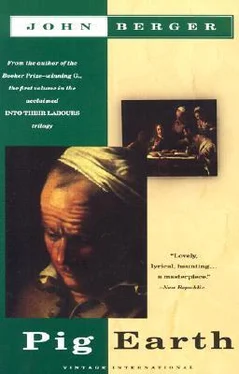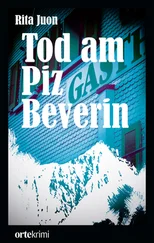I heard you were there.
You were selling soap.
I’ve packed that in now. It was only a stop-gap.
Both men were standing in the kitchen, Marcel at the end where the floor was plain boards, Edouard by the sink where there was linoleum. Both of them were looking at the floor. Marcel raised his head.
You were robbing people. It was an authoritative accusation.
It took out a lot of stains, Edouard smiled.
Monkey-work! Why don’t you practise your trade?
I like the outdoor life, I guess. He paused and then he shouted at the top of his voice, I must have got that from you! You wouldn’t last a day in a factory!
The father shifted his legs, placing them wide apart, as if expecting to be jumped upon.
What you were doing in the market was fraud!
No, it was selling.
It was fraud!
It was selling!
In October Marcel and Nicole lifted the last potatoes. By November the small apples on the trees had turned red. Marcel climbed up to shake them down whilst the cows were still grazing in the orchard. Nicole waited in the cropped grass and the apples fell onto the sheet she had spread out. Each evening Marcel took the mare and tipcart and brought another ten sacks of apples up to the house. Altogether there were sixty sacks: fifty filled with apples and ten with pears.
As the afternoons became shorter, Marcel pressed the cider. The whole yard smelt of apples. He crossed it many times carrying buckets of apple juice to pour into the barrels in the cellar, and sacks of marc on his shoulder to empty into the vat. The vat was as tall as he and a good metre and a half in diameter.
One day, when the snow was not far away, Edouard came into the outhouse where the press was. Marcel scooped up a glass of apple juice and held it out to Edouard, who shook his head.
It gives me diarrhoea.
You can undo the press.
Edouard took off his belted raincoat and hung it on a nail.
You know, you could sell this thing as an antique, said Edouard, a wooden press with 1802 carved on it!
It’s oak.
There’s a dealer in A … who’d give half a million for it.
What would he do with it?
He’d sell it to a bank or hotel.
What?
As décor.
The world has left the earth behind it, said the father.
And what was on the earth? demanded the son angrily. Half the men here had to emigrate because there wasn’t enough to eat! Half the children died before they grew up! Why don’t you admit it?
Life has always been a struggle. Do you think it can ever be anything else?
You were dirt poor!
Marcel removed the fastening bolt without saying a word and the sides of the press opened. They were ribbed like a corset. Edouard lifted out the cake of marc which was as large as a cart-wheel, propped it on a bench by the window, and started to cut the marc into pieces with an axe. It was the consistency of damp bran and it smelt of all that had happened in the orchard since the spring.
It would be quicker to put it through the grinder, Edouard said.
It would be quicker but less good.
Why not use the grinder since you have it? Edouard insisted.
It makes better gnôle if you break it up by hand.
Why?
Marcel shrugged his shoulders. It’s the nature of gnôle . I don’t know why.
Edouard slashed violently with the axe at what remained of the wheel.
My father’s a maniac, he hissed, a maniac!
When the vat was full Marcel covered the marc . The first layer of the covering was newspaper. The paper which came regularly each week into the house was the local one, full of reports of local councils, mayors’ speeches, deaths, market prices, weddings and declarations from the Ministry of Agriculture. Over these news items he spread walnut leaves. And over the leaves he put earth. As the marc fermented each day and reduced its volume, he carefully pressed the covering a little further down.
The vat gave him pleasure, like the hay in the hayloft, or the smoked sausages, made from the pig, which hung from the ceiling above his high double bed. They were achievements which made him feel, as the snow obliterated everything on the ground, that the farm was prepared for the winter. The winter came.
Every pine needle was covered with hoar-frost. The fox stood there, surprised, as though at this season he did not expect to have to hide.
In God’s name he can see I haven’t brought my gun! whispered Marcel.
He had no means to kill the fox and the fox knew it. It was the same fox who had come down and taken nine of Nicole’s chickens before the haymaking, when the grass was high enough to offer him cover. Now he was thin, his coat more grey than brown. Neither man nor animal moved. Faintly from a distant farm, both of them heard a cock crow.
What makes him shake his head like that? Jésus and Marie! He’s cunning, cunning, more cunning than all the rest put together!
The fox, certain of his rights, walked unhurriedly up the slope between the juniper bushes and disappeared under the rocks and pine trees.
There I stood, explained Marcel, empty-handed, and I said to myself: Tomorrow I’ll take the marc. It was the fox who made me decide.
He broke the seal and the initial smell of the marc gave off a kind of warmth in the cold air. He shovelled it into sacks and arranged the sacks in the tipcart. On the way down to the village he rode on the sacks. When he reached the cemetery he got down because there the road climbs.
It began to snow and he swore. As he looked up towards the sky he could see in the distance two electric light bulbs, strung from the tin roof of the engine. They were alight. When he arrived, Mathieu, the distiller, was wiping the sweat off his face despite the cold. Under the engine was a steaming heap of muck, the colour of bile, and every minute the snow falling on the heap made the muck less yellow.
How is the Patronne? Mathieu asked Marcel. She who was the most beautiful bride of her year, the most beautiful mother and now the most beautiful grandmother! The distiller bowed from the waist.
When Mathieu toured with the distilling engines he was expansive and gallant. The pace of the work and the cheating of the state out of some of its taxes inspired him. The rest of the year, working in a furniture factory, he was taciturn and hesitant.
Beechwood, good beef, and a beautiful wife — keep them whoever can! said Marcel.
His voice was gruff in the cold, and the snowflakes on his eyebrows were unmelted. He was still smiling with pride when he shook hands with the five or six men waiting by the engine.
The engine consists of a boiler, three vases and a condenser, mounted on an old chassis. The vases are insulated with planks of wood. The copper pipes which conduct the steam from the boiler to the vases and from these to the condenser are the thickness of a bull’s horns. And they curve like horns too. At the bottom of the condenser was the outlet pipe and under it a small copper pail, filling up with gnôle . That the produce of this gigantic, shaking, copper-horned bull should come, drop by drop, out of a duct no larger than the open beak of a small bird, is a sign of its secret. Its secret is to transform work into spirit. What is emptied into the vases is work; what comes out of the beak is imagination.
Mathieu pulled a tragic face, waved his arms and bawled:
Shut off!
One of his assistants shut off the boiler, and the other climbed up to loosen the holding nuts which clamped the lids to the vases. Scalding steam hissed out from under the loosened lids and immediately turned as thick and white as smoke. From the tin roof a tarpaulin hung down to the ground to protect the waiting men from the weather. Between the engine and this tarpaulin, the white steam now made it impossible for the men to see their own arms.
Читать дальше












